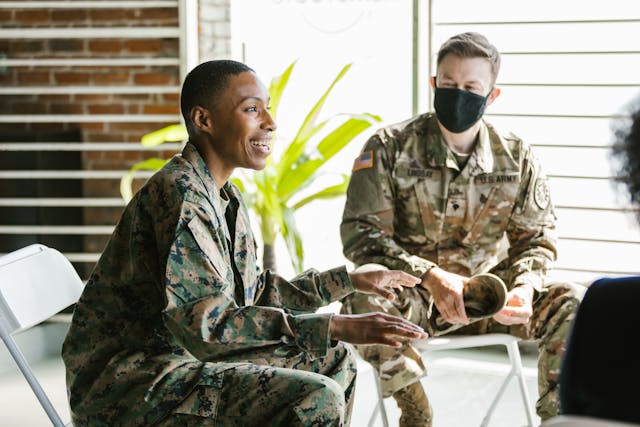
Transitioning from military to civilian life can be a significant adjustment for veterans.
The skills and experiences gained during service are invaluable, yet finding a new path in the civilian world often requires more than just those experiences.
Personal development plays a crucial role in helping veterans navigate this transition.
By focusing on personal growth, veterans can not only adjust to civilian life but also thrive in it.
This guide explores the importance of personal development for veterans, the challenges they commonly face, and practical steps they can take to build a fulfilling post-military life.
Importance of Personal Development for Veterans
Personal development involves a continuous process of self-improvement in knowledge, skills, and well-being.
For veterans, personal development is particularly vital because it helps bridge the gap between military service and civilian life.
According to a study published in the Journal of Veterans Studies, veterans who actively engage in personal development report higher levels of satisfaction in their post-military lives compared to those who do not.
In the military, veterans are often used to a structured environment with clear roles and responsibilities. However, the civilian world is different.
It demands adaptability, new skills, and often a shift in mindset.
Personal development helps veterans identify their strengths and weaknesses, set new goals, and develop the skills necessary to achieve them.
It’s not just about career growth but also about improving mental health, building strong relationships, and achieving overall well-being.

Common Challenges
Veterans face several unique challenges when transitioning to civilian life, which can impact their personal development.
Understanding these challenges is the first step towards overcoming them.
Identity shift
When veterans leave the military, they often experience a significant shift in identity.
In the military, there’s a strong sense of purpose, structure, and belonging.
Veterans are part of a close-knit community with a clear mission and roles.
When they transition to civilian life, they may struggle to find a similar sense of purpose or belonging.
This can lead to feelings of loss, confusion, or uncertainty about their new identity and place in the world.
Skills translation
Veterans acquire a range of valuable skills during their service, such as leadership, problem-solving, and technical expertise.
However, translating these skills into the civilian job market can be challenging.
Veterans might find it difficult to communicate how their military experience is relevant to civilian jobs or how to present their skills in a way that resonates with potential employers.
Mental health
Mental health issues, including post-traumatic stress disorder (PTSD) and depression, are significant challenges for many veterans.
Studies show that between 11-20% of veterans who served in Operation Iraqi Freedom and Operation Enduring Freedom experience PTSD each year.
These conditions can make personal development and transition to civilian life more difficult.
Social reintegration
Reintegrating into civilian society can be a tough process, particularly when it comes to building new social networks and relationships.
Veterans are used to the camaraderie and support of their military community, and finding similar connections in civilian life can be challenging.
Building a new social circle, participating in community activities, and staying connected with other veterans can help ease this transition.

Developing New Skills and Career Paths
One of the most significant aspects of personal development for veterans is developing new skills and exploring new career paths.
Many veterans find that their military skills are highly transferable but require some adjustment to fit into civilian roles.
Here’s how veterans can approach this:
Identify transferable skills
Veterans possess a range of valuable skills from their military service, such as leadership, teamwork, problem-solving, and adaptability.
These skills are often highly relevant in civilian jobs but may need to be presented differently.
For instance, the leadership experience gained in the military can translate to management roles in civilian companies.
Seek education and training
Furthering education or obtaining additional certifications can greatly enhance a veteran’s career prospects.
Programs like the GI Bill provide educational benefits that can cover tuition and other expenses for higher education or vocational training.
Use veteran-specific career services
There are specialized organizations designed to support veterans in their career transition.
Groups such as Hire Heroes USA and the Veterans Employment and Training Service (VETS) offer resources tailored specifically for veterans.
Networking
Building a professional network is essential for finding new job opportunities.
Veterans should seek out and join veteran-focused professional groups, attend networking events, and connect with others in their desired field.
Networking can provide valuable connections, job leads, and insights into the civilian job market.

Maintaining Physical and Mental Health
Physical and mental health are foundational to personal development.
Without good health, it’s challenging to focus on growth and achieving new goals.
For veterans, maintaining health often means addressing both physical injuries sustained during service and mental health issues.
Regular exercise
Physical health plays a critical role in overall well-being.
Regular exercise helps reduce stress, improve mood, and maintain physical fitness.
Veterans should find an exercise routine that they enjoy, whether it’s running, yoga, swimming, or weightlifting.
Mental health support
Mental health is equally important as physical health, and seeking support is crucial.
Veterans should not hesitate to seek help for mental health issues, such as PTSD or depression.
The Veterans Health Administration provides various mental health services, including counseling and therapy, which can be beneficial in addressing these concerns and improving overall mental well-being.
Mindfulness and meditation
Practices like mindfulness and meditation can be valuable tools for managing stress and enhancing mental health.
These techniques help veterans focus on the present moment, reduce anxiety, and improve emotional resilience.
Mindfulness and meditation can be particularly helpful for those dealing with PTSD or other anxiety-related conditions.
Healthy eating
Nutrition has a significant impact on both physical and mental health.
Maintaining a balanced diet can improve energy levels, mood, and overall well-being.
Veterans should aim to include a variety of fruits, vegetables, lean proteins, and whole grains in their diet to support their health and help them feel their best.

Building Strong Relationships
Relationships are a key aspect of a fulfilling life.
Building strong, healthy relationships can provide veterans with the support and companionship they need as they transition to civilian life.
Reconnect with family and friends
Military service often means long periods away from loved ones, which can strain personal relationships.
As veterans return to civilian life, it’s important to make an effort to reconnect with family and friends.
This means reaching out, spending quality time together, and being open about the experiences and emotions they’ve gone through.
Join veteran support groups
Connecting with other veterans can be incredibly beneficial during the transition to civilian life.
Support groups specifically for veterans offer a unique space where individuals can share their experiences, challenges, and successes with others who understand their situation.
Volunteer
Volunteering is a great way for veterans to give back to their communities while also meeting new people.
Engaging in volunteer work can provide a sense of purpose and fulfillment, helping to bridge the gap between military service and civilian life.
Seek professional help
If veterans are struggling with relationships or social reintegration, seeking help from a counselor or therapist can be very beneficial.
Professional guidance can provide valuable strategies for managing relationships and overcoming social challenges.

Financial Planning for Veterans
Financial stability is a critical component of personal development.
Many veterans face financial challenges when transitioning to civilian life, from managing benefits to finding a new job.
Here’s how veterans can achieve financial stability:
Understand benefits
Navigating the various benefits available to veterans can be complex.
It’s essential for veterans to fully understand what they are entitled to, including the GI Bill, disability compensation, and VA loans.
These benefits can provide significant financial support during the transition.
Create a budget
Developing a budget is a fundamental step in managing finances effectively.
Veterans should outline all sources of income and track their expenses to ensure they are living within their means.
A well-structured budget helps in managing day-to-day expenses and planning for future financial needs.
Seek financial counseling
any organizations offer financial counseling tailored specifically for veterans.
These services can assist in budgeting, managing debt, planning for future expenses, and avoiding common financial pitfalls.
Financial counselors can provide personalized advice and strategies to help veterans achieve financial stability and long-term success.
Invest in the future
Long-term financial planning is crucial for building a secure financial future.
Veterans should consider saving for retirement, investing in financial growth, and setting aside funds for unexpected expenses.
Establishing a solid financial foundation helps ensure stability and security over the long term.
Final Thoughts
Personal development is a lifelong journey that doesn’t end with military service.
For veterans, investing in personal growth can make all the difference in achieving a successful and fulfilling post-military life.
By focusing on developing new skills, maintaining physical and mental health, building strong relationships, and achieving financial stability, veterans can thrive in their new civilian roles and find purpose beyond their service.


